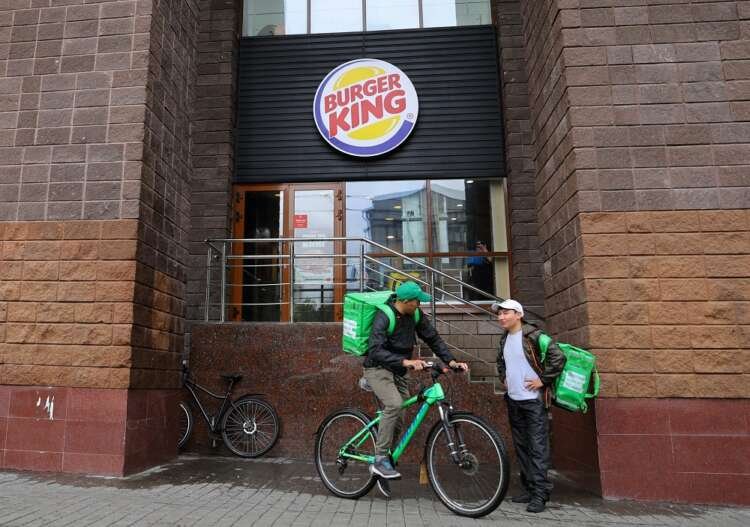Burger King caught in complex legal web, thwarting Russia exit


By Hilary Russ
NEW YORK (Reuters) -For at least a decade, Burger King’s formula for European expansion has relied on a joint venture partnership, including a master franchisee, to open and operate new locations.
But now the fast-food chain has a whopper of a problem in Russia. It hasn’t been able to exit its partnership or close its roughly 800 franchised locations following Russia’s February invasion of Ukraine.
Burger King halted corporate support for its Russia locations in March. Parent company Restaurant Brands International Inc (RBI), which was formed in 2014 when Burger King merged with Tim Hortons, said on March 17 that it was trying to sell its stake in the joint venture.
However, the restaurants remain open and thriving in locations such as central Moscow where queues have become the norm. Demand has been helped by rival McDonald’s currently being closed ahead of a reopening under new branding later this month.
“I usually go to Burger King, I don’t care about McDonald’s,” said university teacher Elena Aleksandrova, 37, as she picked up a Whopper and soda on Friday at a Burger King in an underground shopping mall just outside the Kremlin.
McDonald’s struck a deal last month to sell its Russian business to one of its local franchisees, retaining an option to buy the business back within 15 years. Burger King’s exit is proving far more problematic.
Current sanctions by western countries against Russia sharply limit the pool of possible buyers, one person familiar with the matter said.
Reuters could not determine the status of any negotiations.
Part of the problem, lawyers said this week, is the complexity of its joint-venture-style master franchise agreement, which allows Burger King to profit from sales of Whopper burgers without the risk of using its own capital.
Unlike rival McDonald’s Corp, which owned the vast majority of its Russia locations, Burger King’s Toronto-based parent doesn’t own any of its own restaurants in Russia.
“There’s just a really complex contractual and legal atmosphere right now that’s giving franchisees and franchisors in Russia no good option,” said Liz Dillon, partner at Lathrop GPM in Minneapolis.
According to a March 17 open letter to employees from RBI International President David Shear, RBI holds a 15% stake in Burger King Russia Ltd, its Russia joint venture.
Additional partners are Russia’s state-owned bank VTB, which has been sanctioned by the United States and European Union, and Kyiv-based private equity and asset management firm Investment Capital Ukraine (ICU), Shear’s letter said.
And Alexander Kolobov, Burger King’s master franchisee in Russia, owns 30% of the joint venture, Kolobov told Reuters in an email in March.
RBI blamed Kolobov for refusing to shut restaurants, according to Shear’s letter. But Kolobov told Reuters at the time that he had never had full operational control and lacked the authority to close restaurants without agreement from all the joint venture partners.
A spokesperson for Kolobov said via email that he declined to comment on whether he was in talks to buy RBI’s stake of the joint venture. RBI referred Reuters back to Shear’s letter. VTB could not be reached for comment.
A franchisor “can’t physically or legally stop a franchisee from operating if they wish to do so” in the current situation, said Lee Plave, a franchise attorney at Plave Koch PLC in Virginia. “The legal remedies that are available take time, and even when you pursue them, you’d still end up in a Russian courtroom to enforce an order, which is an unlikely prospect at this time.”
To be sure, some lawyers told Reuters that forcing franchisees to close their locations is unfair to regular Russian people who had nothing to do with the government’s decision to invade Ukraine. “The franchisees in Russia are not the ones waging war on Ukraine. The customers who go into those stores are not the ones waging war,” said Beata Kraukus, a franchise lawyer at Greensfelder in Chicago.
Leaving Russia also potentially exposes companies to a new law advancing there that would allow the government to seize local assets of western companies that exit – adding pressure on companies to remain.
Burger King’s parent and other U.S.-based companies will soon be subject to a new rule from the Biden Administration – taking effect June 7 – that limits their ability to provide “management consulting services” to anyone in Russia.
Some lawyers believe the rule could be read to cover services that brands normally provide to franchisees, including sourcing products, management techniques, inventory controls, site selection, operations manuals and even just taking a call seeking advice.
“It puts a lot of pressure on these companies,” said Erik Wulff, a partner at DLA Piper in Washington, who specializes in franchise law for global consumer product, clothing and footwear companies.
“What will likely happen in a number of these situations is that the U.S. partner will be bought out,” Wulff said. “At that point, it’s a distressed sale.”
(Reporting by Hilary Russ; Editing by Diane Craft and Matt Scuffham)
A joint venture is a business arrangement where two or more parties agree to pool their resources for a specific project or business activity, sharing profits, losses, and control.
Corporate support refers to the assistance and resources provided by a parent company to its subsidiaries or franchises, which can include financial aid, marketing, and operational guidance.
A master franchisee is a person or company that has the rights to sub-franchise a brand in a specific territory, managing and supporting other franchisees under the brand.
Explore more articles in the Top Stories category











